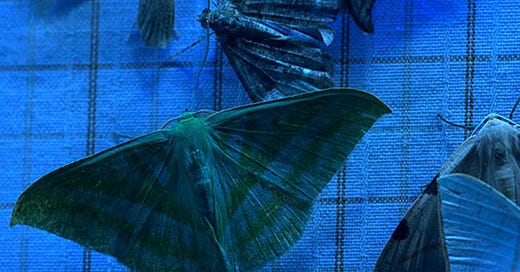Sometimes you just need to stare at some moths
Watching ‘Nocturnes’ is a needed meditative experience
I’m probably not alone in my retreat from visual noise this week. Deleted Twitter (long overdue), deleted TikTok (I’ll miss your bad customer service videos, “lttlebean”, but it had to be done), and have steered well clear of cable news clips and reaction videos on YouTube. I’m exhausted, in every way, and my brain needs a break.
It was likely a coincidence that the programmers at UW Cinematheque scheduled “Nocturnes” to premiere in Madison two days after Election Day. But maybe not. Either way, “Nocturnes” is a beautiful, meditative nature documentary that’s like a sensory balm in chaotic times.
Filmmakers Anirban Dutta and Anupama Srinivasan observe two Indian scientists, Mansi and Bicki, who are in turn observing the moths who live in the verdant mountains of northeastern India.
Much of the film is simply looking at these moths – thick clouds of insects that swirl in the evening sky, or a panoply of hundreds of moths who alight onto the lighted blue cloth that Mansi and Bicki hang in the forest to lure them.
We get time, a lot of time, to simply watch these creatures. Some moths are big, flappy insects, like miniature bats. Others are tiny jewels. Bicki points out the “death’s head” moth made famous by the movie poster for “Silence of the Lambs,” although the skull design on its back looks cuter than on the poster.
All the while our ears are filled with the thick sound bath of the moths’ fluttering, something the insects do to keep warm, Bicki says. The experience of watching the 83-minute “Nocturnes” exists somewhere between a nature documentary and an art installation, requiring patience from the viewer. I watched it on a desktop screen and found myself immersed in its world, so I can only imagine how effective it would be in a darkened theater.
Some more disquieting themes about the long-term prospects of these moths in a world experiencing climate change. Bicki notices that she’s seeing less of one kind of moth on the sheet at night, its habitat disrupted as the mountains get warmer. Even here, in the remote mountains of northern India, action (0r inaction) made in power centers thousands of miles away has an irreversible impact.
That undercurrent of worry made me appreciate the moths (and the two humans) in “Nocturnes” even more. To simply be still, and notice the world around you and its delicate interconnectivity, can be the most restorative thing.
“Nocturnes” has its Madison premiere at 7 p.m. Thursday at UW Cinematheque, 4070 Vilas Hall. The screening is free.



